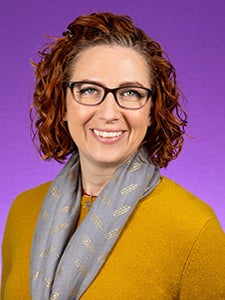Sarah Page

About Me
Dr. Sarah Page is a Teaching Associate Professor who primarily teaches undergraduate courses. Some of these courses are Introduction to Anthropology (ANTH 1000), Global Understanding (ANTH 1050), Human Sexual Behavior from an Anthropological Perspective (ANTH 2025), Women’s Roles in Cross-Cultural Perspective (ANTH 3200), Cultures of the Caribbean (ANTH 3016), and Theory in Anthropology (ANTH 4025, required for Anthropology majors).
Dr. Page is a four-field trained, Caribbeanist, sociocultural anthropologist specialized in human rights, gender and sexuality studies, and the Black Atlantic, with implications for cultural studies, political economy, migration, and health. Her interdisciplinary research is deeply enmeshed in the long project of decolonization, as well as in the plight of highly marginalized people who face exclusion so totalizing that it displaces them economically, socially, and, in some instances, pushes them into exile. This research contributes to an ongoing, global project aimed at reducing vulnerability of sexual minorities. In addressing a politics of Othering intersecting issues of human rights, this work highlights the need for such projects to continue and to evolve to meet the needs of vulnerable global citizens. It is therefore Dr. Page’s research mission to carry this work forward in future research projects, in alignment with her deep commitment to ameliorating the devastating effects of politicized homophobia, institutionalized racism, gender violence, and poverty.
Dr. Page’s teaching orientation highlights the distinctive features of anthropology, and its approach to human challenges—not only those faced in the present moment, but the discipline’s capacity to anticipate threats to humanity looming in its future. She encourages her students to consider culture as a solution set to a shared constellation of human problems, with the understanding that culture may present nearly as many challenges as it does solutions. Dr. Page urges students to immerse themselves in the wisdom of societies which have preceded us (accounting for global processes and substantive harm to those cultures diminished and lost via colonization and globalization), as they envision new answers to the existential threats humans collectively face. This imperfect world previous generations have built is the one they inherit, and it is by the intervention of this youngest generation that impending crisis might be averted.
To help her students gain a sense of not only the past and future of the discipline, Dr. Page opens the realm of contemporary anthropology to them. In her teaching methodology, she emphasizes ethnographic research design and methods, utilizing scaffolded approaches to academic writing. Discussion-based, Socratic explorations of compelling social problems, as well as participatory and peer learning are integral to teaching this skillset by facilitating multiple access points through which students can personally invest into anthropological perspectives. Drawing upon Universal Design, Dr. Page create an environment conducive to a variety of learning styles and establishes the classroom as a supportive space in which students challenge themselves while connecting with their peers through compassionate, respectful interaction in which each feels validated and can acquire knowledge unimpeded. As such, she prepares students to become collaborative participants in discursive learning communities as an essential component of their professionalization. At the same time, Dr. Page directs students to find their own interests within the purview of a topical area of the courses she teaches. Even as they work within the constraints of ethnographic research design, her students can explore their creativity to answer compelling research questions they individually pose. Extending ethnographic writing, Dr. Page supports students to work with a variety of ways to share their findings incorporating tools like data visualization, infographics, podcasts, and short videos. These newer modes foster nuanced understandings in interpreting meaning, ultimately enhancing intertextuality and deepening the richness of ethnographic storytelling. By promoting a variety of modalities as valid forms of expressing quantitative and especially qualitative data, students’ sense of curiosity and wonder, the bedrock of scientific inquiry, is nurtured.
Education
2018 Ph.D., Anthropology, University of Florida
2008 M.A., Anthropology, University of Florida
2004 B.A., Anthropology, University of Tennessee
Publications
2023. Grace-McCaskey, Cynthia A., Maria C. Ramos, Anja Sjostrom, Sarah E. Page 2023.“Combining social network analysis and ethnography to better understand fishers’ organization and promote sustainable small-scale fisheries in St. Croix, US Virgin Islands.” Marine Policy Volume 152 June 2023. https://www.sciencedirect.com/science/article/pii/S0308597X23001008